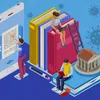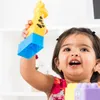Digital learning – a new beginning or a rising concern?
If utilised appropriately in a planned manner, online education can become a gift of this global pandemic as it would break physical barriers for providing with quality content to remotest places.

One of the biggest impacts of the current global crisis, apart from socio-economic turbulence, is the growing dependence on the Internet. From students and working professionals to independent influencers, everybody is now used to the new digital normal.
The continued lockdown phases, followed by strict quarantine rules, made people discover new ways of entertainment.
They found joy in sitting back at home and binge-watching their favourite sitcoms, connecting with their friends and relatives via video calls, and cook together while watching chefs on YouTube making the most out of their quarantined lifestyle. Thus, making the digital platforms a mainstream during the most difficult times.
The increasing hazards of the global pandemic has also put teachers and edtech entrepreneurs in a situation where the digital medium of delivery and consumption has become the new normal.
But, at the same time, there is a concern surrounding the health of younger children if put in an enclosed environment.
So, it is imperative to create solutions to make them comfortable with digital education and virtual learning experience for better adaptability and retention of focus.
Online learning
These are trying times for humanity. Students are battling to adjust to their new schedule, not meet their companions in person, and study in an open environment of school or university, as they typically would.
The educators, therefore, must acquaint themselves with the new ways of teaching that they have never experienced themselves before, while the parents must balance their child’s education and their occupation in parallel.
Although many individuals were reluctant initially about this alternative, increasingly it is felt that web-based learning can be of great advantage if adapted in the correct way. The educators as well as parents must figure out how to find harmony while giving online education to the kids and improve their understanding.
In an average classroom, which has about 40 students, it is hard for introvert kids to lift their hands and ask questions. Online classes can provide privacy, where they may not be so terrified of conversing with the teacher from behind the screen. This assists them with better performance and urges them to be more involved in the web classroom exercises.
The manner in which students can be educated online are boundless. They can learn so much more when teachers utilise virtual devices like PowerPoint presentations/recordings, videos, and animations to explain a concept.
AI-based tools are providing options of adaptive learning or even keeping personalised tracks, making data available to a teacher to keep a better track that one can do in a physical class.
However, the enhanced screen time of the students has upset a great deal of parents. Youngsters invest much more energy in front of the screen not just for everyday classes, but for downloading notes, doing homework, and extra research.
Apart from academics, their involvement in extracurricular exercises has pushed them to spend more time online due to the digital influx recently. Web-based learning has likewise decreased the personal interaction between students and teachers, thus limiting the communication and personal feeling of the environment.
Finding the middle ground
Today, when children are surrounded by digitisation 24x7, it has become important to engage them with the 4Cs of the advanced world, namely communication, critical reasoning, collaboration, and creative thinking.
Communication can be grown significantly utilising the online platform. Remote correspondence with students across the globe causes them to acknowledge various societies, cultures, and ways of living.
Critical reasoning includes the capacity to prepare arguments and evidence. The huge number of online platforms accessible today assists students in creating answers for questions that require higher order thinking skills (HOTS).
It also helps in developing alternate points of view that they can debated with their peers. Online group exercises sorted out by a teacher can help in building team spirit among children. They also learn life-skills such as leadership, motivation, and empathy as they communicate with their virtual partners.
Because of the internet, students can improve their creative thinking abilities by enrolling in youth-engaging programs like mobile app Designing and development, podcasting and robotics, to name a few. It is noteworthy that with the assistance of online software and future advances, these students have turned their leisure time into something productive.
Every time humans are introduced to new uses of technology, it either becomes a boon or a bane – depending on the level of its influence. Similar is the case with online education.
If utilised appropriately in a planned manner, it very well can become a gift of this global pandemic as it would break physical barriers for providing with quality content to remotest places and bring the youth across geographies together.
At the same time, educators need to provide alternatives to the youth to be able to learn or be engaged with options that remained unexplored till now. More involvement in policy work, sports or similar options can help create a funnel for a better prepared youth that will be ready to take on global challenges.
Edited by Megha Reddy
(Disclaimer: The views and opinions expressed in this article are those of the author and do not necessarily reflect the views of YourStory.)









